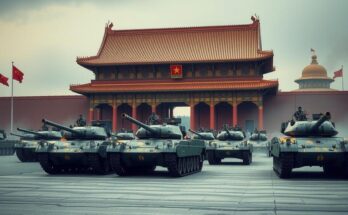The M23 rebels in Goma, eastern Congo, proclaimed a unilateral ceasefire due to humanitarian needs, amid escalating conflict resulting in over 900 deaths. They stated the ceasefire would start Tuesday and reassured that they do not plan to attack Bukavu. International leaders have called for peace negotiations, with local authorities expressing readiness for dialogue based on previous agreements. Displacement of local populations and ethnic tensions persist, complicating the situation further.
The M23 rebels, supported by Rwanda, announced a unilateral ceasefire in Goma, eastern Congo, aimed at facilitating humanitarian efforts amid an escalating conflict that has resulted in significant casualties. This announcement follows alarming reports from the U.N. health agency, which indicated that fighting in the region has led to at least 900 deaths. The ceasefire is set to begin on Tuesday, following calls for the establishment of safe corridors for displaced civilians.
The M23, a rebel group asserting its support for ethnic Tutsis in Congo, proclaimed that they have no intention of advancing towards other cities, including Bukavu. Lawrence Kanyuka, a spokesperson for the rebels, emphasized their commitment to protect civilians and maintain control over liberated areas. Meanwhile, the Congolese government has not publicly responded to this declaration.
This ceasefire comes before a summit of regional leaders, including the presidents of Congo and Rwanda, amid growing international concern voiced by G7 foreign ministers calling for a peaceful resolution to the conflict. The Congolese authorities expressed willingness to engage in negotiations, contingent upon adherence to prior peace agreements that some parties claim have been undermined.
M23’s resurgence has been attributed, in part, to the backing of 4,000 Rwandan troops, marking a significant increase in foreign military support compared to earlier conflicts. As fighting intensifies, a humanitarian crisis looms, with hundreds of thousands displaced and seeking refuge, many fleeing into neighboring Rwanda. Ethnic tensions from the region’s history add further complexity to the ongoing violence, with both sides targeting accused aggressors.
As families in Goma confront the harsh realities of conflict, many have turned to morgues in distress to retrieve the remains of their loved ones. Individuals like Chiza Nyenyezi and Louise Shalukoma expressed profound grief over lost family members, underscoring the personal toll of the ongoing violence in Congo.
In summary, the declaration of a ceasefire by the M23 rebels represents a potential turning point in the conflict in Goma amid high human casualties and calls for humanitarian assistance. The international community continues to press for negotiations to secure peace while grappling with the repercussions of past conflicts that continue to shape the current crisis.
The ongoing conflict in eastern Congo, particularly in cities like Goma, has deep historical roots tied to ethnic tensions and regional instability. The presence of various rebel groups, particularly the M23, has resulted in significant violence, drawing international attention to the humanitarian crises caused by such conflicts. Tensions between ethnic Hutus and Tutsis, stemming from the 1994 Rwandan Genocide, also contribute to the complexities surrounding the current situation. The need for a humanitarian ceasefire amidst such deep-seated issues underscores the fragility of peace in the region.
The unilateral ceasefire announced by the M23 rebels signifies a crucial opportunity for respite in an area afflicted by violence and humanitarian distress. While this decision aims to facilitate much-needed aid to civilians affected by conflict, it also poses challenges as ethnic tensions remain unresolved. Both local and international parties stress the importance of cooperating for a lasting peace, as historical grievances and military interventions complicate the path forward.
Original Source: apnews.com




